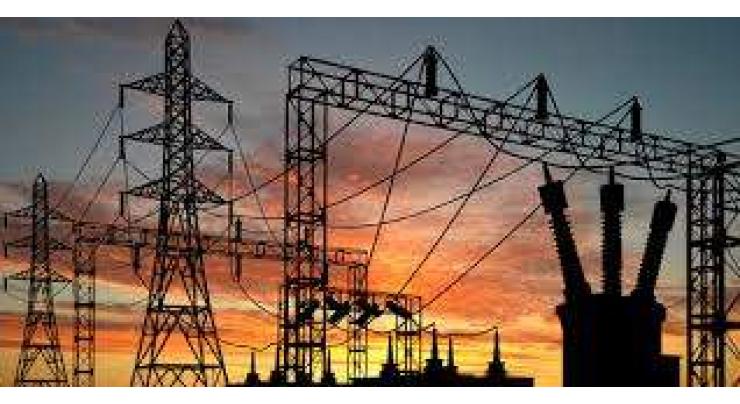
Inefficiencies In Power Sector Cost Pakistan $18 Bln A Year: World Bank Report
Fahad Shabbir (@FahadShabbir) Published December 12, 2018 | 04:53 PM

Pakistan's power sector suffers from inefficiencies that cost the economy $18 billion or 6.5 percent of GDP in fiscal year 2015, according to a new World Bank report
ISLAMABAD, (UrduPoint / Pakistan Point News - 12th Dec, 2018 ) :Pakistan's power sector suffers from inefficiencies that cost the economy $18 billion or 6.5 percent of GDP in fiscal year 2015, according to a new World Bank report.
Costs are far greater than previous estimates based on fiscal costs alone. Reforms could save Pakistan's economy $8.4 billion in business losses and could increase total household incomes by at least $4.5 billion a year.
The report titled "In the Dark, how much do power sector distortions cost South Asia", states that Pakistan has made great strides in expanding electricity access and capacity.
Around 91 million more people are receiving electricity for the first time from 1990 to 2010. However, up to 50 million people still do not have access to grid electricity and frequent load shedding damages businesses and the health and living standards of consumers.
Pakistan can boost economic growth and job creation by overcoming inefficiencies in its power sector," says World Bank country director for Pakistan Illango Patchamuthu. "Reforms that address these distortions can make better use of existing facilities. These need to focus on eliminating waste, promoting the shift towards cleaner energy and attracting private investments." Addressing the report launching ceremony held here at the WB office on Tuesday, Author of the report Fan Zhang said almost a fifth of electricity generated is lost through poor infrastructure, faulty metering and theft.
"Load shedding is caused by high cost, losses and subsidies which compromise investments and the ability to procure fuel. A lack of grid electricity also impacts health, as it leads to greater use of kerosene lamps, causing indoor air pollution linked to respiratory infections and tuberculosis risks," she added.
The report argues that reforms that focus solely on liberalizing energy prices would lead to an excessively high cost of electricity because of inefficiencies in the system, negatively impacting the poor and vulnerable.
Reforms must therefore go beyond liberalizing energy prices to address several aspects of the power sector distortions, including prioritizing gas allocation for efficient power generation and adopting tariff mechanisms that encourage performance.
For the benefit of consumers, reforms should focus on rationalizing consumer prices for electricity and gas to reflect supply costs, and social assistance to help vulnerable populations cope with increased energy prices. Increased access to reliable power must be made a priority.
"Power sector reform should be top priority, as few other reforms should yield economic gains of a similar magnitude so quickly, based on findings from this report," Fan Zhang added. "If well designed, these reforms will directly benefit the poor by increasing access, improving reliability, and reducing cost and pollution." Speaking on the occasion, Chairman Task Force on Energy Reforms Nadeem Babar said the government was planning to phase out all inefficient and old power plants within 4-5 years.
"At present we are not running the old and inefficient power plants and we will gradually shut down such plants to save huge amount of money," he added.
However, he admitted that the country was facing severe crisis in electricity transmission system which was causing a huge loss to the national exchequer.
He said although the government was producing cheaper and sufficient electricity to meet the country's demand, but the transmission system was not capable enough to bear full load of electricity.
He said the government would end all constraints in country's transmission system by end of next year.
He informed that during last few years, three new RLNG based power plants were installed in the country which were one of the most efficient power plants in the world.
Nadeem Babar said the government was drafting a new energy policy to streamline the power sector and it would be finalized by end of next month.
Related Topics
Recent Stories

Tennis: ATP Barcelona Open results - 1st update

Swiatek's perfect 10 in Stuttgart as Vondrousova stuns Sabalenka

Arandu's roads closed due to flooding

Oil tanker catches fire in Islamabad’s Blue Area

Pakistan committed to ensure safety of foreign nationals: FO

Tennis: WTA Stuttgart results - 1st update

Four passengers injured as train hit an empty vehicle

Over- speeding bus crushed to death two bike riders

Turkey's Freedom Flotilla ready to set sail for Gaza

French teen dies from heart failure after knife attack near school

Iranians appear unfazed by Isfahan blasts

UAF celebrates Int'l Chinese Language Day
More Stories From Business
-

Pakistan aims to agree outline of new IMF loan in May - Finance Minister
8 hours ago -

FTO commends FBR's role for prompt resolution of tax payers’ issues
8 hours ago -

BISP embraces E-procurement: launches inaugural tender
10 hours ago -

Business community indebted to Ahsan Zafar for his unprecedented services: Yousuf Rajput
10 hours ago -

China auto sector steps up Europe push with Spain plant
10 hours ago -

Condolence reference held in memory of FBR's officials
12 hours ago
-

Health activists ring alarm bells over 10-stick cigarette pack
12 hours ago -

Karachi receives maiden direct flight of Azerbaijan Airlines from Baku
12 hours ago -
PSX turns bullish, gains 619 points
13 hours ago -

Rupee bounces back; gains 13 paisa against dollar
12 hours ago -

Partners join hands for alternate use of marble, granite slury
12 hours ago -
Tokyo's Nikkei index tumbles 3% in morning trade
15 hours ago















